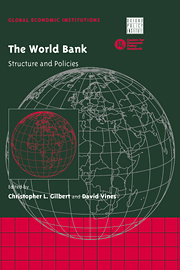Book contents
- Frontmatter
- Contents
- List of figures
- List of tables
- List of contributors
- Acknowledgements
- Introduction
- 1 The World Bank: an overview of some major issues
- Part One The World Bank's Structure: The Bank as an Institution
- 2 Positioning the World Bank
- 3 The World Bank and poverty reduction: past, present and future
- 4 Why the World Bank should be involved in development research
- 5 The challenges of multilateralism and governance
- Part Two The Effectiveness of World Bank Assistance
- Index
4 - Why the World Bank should be involved in development research
Published online by Cambridge University Press: 12 October 2009
- Frontmatter
- Contents
- List of figures
- List of tables
- List of contributors
- Acknowledgements
- Introduction
- 1 The World Bank: an overview of some major issues
- Part One The World Bank's Structure: The Bank as an Institution
- 2 Positioning the World Bank
- 3 The World Bank and poverty reduction: past, present and future
- 4 Why the World Bank should be involved in development research
- 5 The challenges of multilateralism and governance
- Part Two The Effectiveness of World Bank Assistance
- Index
Summary
Introduction
My years as Director of the World Bank's Research Department from 1993 to 1997 gave me ample cause to contemplate the issue raised in the title of this chapter. In most institutions that are engaged primarily in operations – whether it be production or, as in the case of the World Bank, lending – some staff inevitably view research and other analytical work as a luxury. Budget reallocation brings calls for a reevaluation of such ‘frills’. These circumstances require that the research programme be kept active and effective. In this chapter, I spell out why the World Bank should be involved in development research and, wherever possible, illustrate how it has lived up to its potential. Evidence shows that on the whole the effort has been a success, and widely recognised as such.
Economics tells us that the creation and dissemination of knowledge has the key attributes of a public good. Knowledge is non-rivalrous because my use of a piece of knowledge does not preclude its use by others. Thomas Jefferson put this well when he said: ‘He who receives an idea from me, receives instruction himself without lessening mine; as he who lights his taper at mine, receives light without darkening me.’ Knowledge is also non-excludable – it is often difficult for the creator of knowledge to prevent others from using it. As is well known, these two attributes result in undersupply – individuals and firms will under invest in the creation of knowledge because they receive only a small part of the total benefits to society, but they bear the full costs.
- Type
- Chapter
- Information
- The World BankStructure and Policies, pp. 108 - 131Publisher: Cambridge University PressPrint publication year: 2000
- 12
- Cited by

